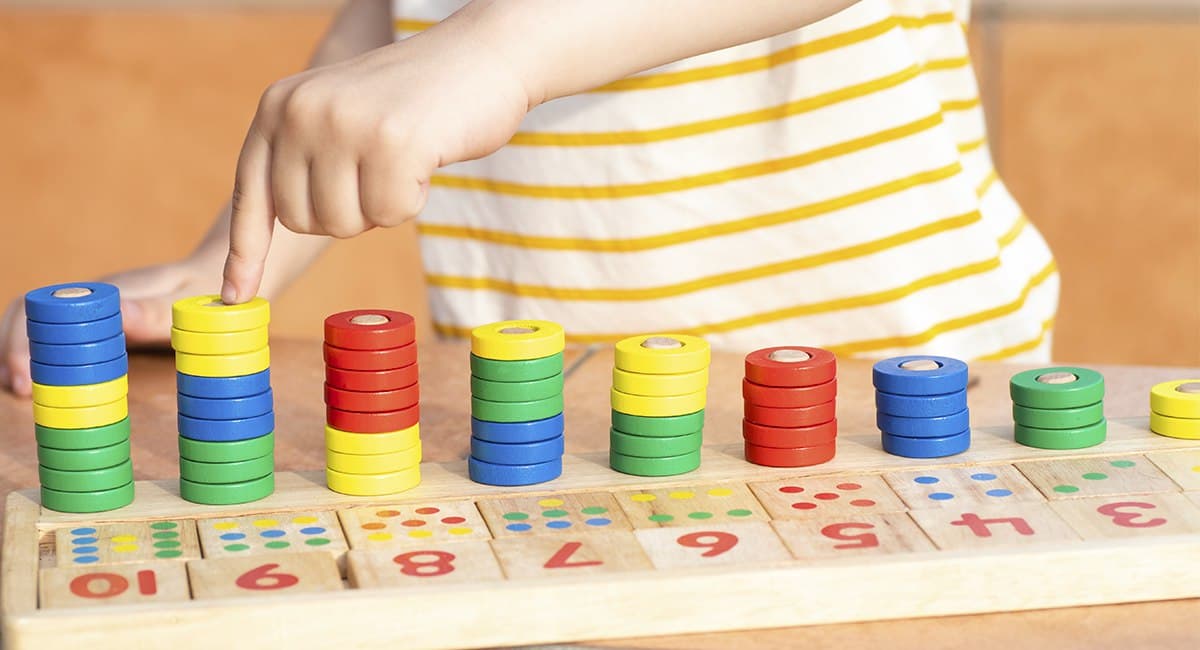Mathematics is closely linked to our environment. It is therefore important to stimulate and develop mathematical skills in children.
What benefits does it offer? And how can you achieve them?

The concept of mathematical competence
Mathematical competence is not the same as mathematical ability. Mathematical competence combines the ability to use numbers and the basic operations that can be performed between them to interpret different types of information. It helps us to solve and solve everyday and complex problems.
Developing mathematical competence in children is useful for their learning. In short, mathematical competence combines mathematics with real-world problem-solving. In other words:
"The point of mathematics is not to complicate simple things but to make complex things simple." (Stan Goodier)
Since the cradle of humanity, we have had the need to measure, identify, quantify and describe everything around us. In fact, the development of mathematical competence and human civilization has gone hand in hand. It is therefore important to stimulate and develop mathematical skills in children.
Aspects included in mathematical skills
- The ability to interpret information or data about things around us.
- Management of basic mathematical elements (measurements, geometric elements, etc.) in everyday life.
- Reasoning processes that solve problems in different contexts.
The importance of stimulating mathematical skills in children
This in itself is logical: mathematical thinking is fundamental as it involves the understanding of abstract concepts and also helps in understanding different relationships.
These skills contribute to a person's ability to reach their full potential, helping them to successfully achieve their goals.
Intelligence is also developed in problem-solving. It also establishes relationships between different concepts and facilitates planning for desired goals.

Ways of developing mathematical skills in children
Note that when stimulating your child's mathematical skills, you should consider his or her age to make it appropriate, and respect the child's own development and pace.
Here are some ways to do this:
1. Independent experiments
Have your child experiment with different objects. In this way, they will become aware of their own characteristics and see the differences and similarities. In this way, you will also stimulate your child's motivation and curiosity.
2. Plan the logistics for different activities
Suggest different activities that include classifying, comparing, or identifying different objects. This way you promote understanding of the relationships between objects.
3. Tell your children about the causes and effects of actions and use observations to draw conclusions.
Children should learn that the decisions they make in everyday life have consequences and consequences. Through this, you should encourage deductive reasoning to solve problems.
Observations you should encourage your child to use them in different scenarios to better understand the environment associated with mathematical actions.
4. Use puzzles and games to help them solve problems
You can use different games that stimulate thought development, such as riddles, Sudoku and card games, and various online games. Solve problems that require a mental effort on the part of the child. Read more about other positive qualities of online games here: https://battrenyheter.se/artikel/hur-onlinespel-kan-positivt-paverka-ditt-liv/.
You need to be sensitive to their age because they will get frustrated and give up if the problem proves too difficult for them.
5. Motivate them to think and ask questions
Encourage your children to reflect on certain things in everyday life, including things that seem inexplicable, and then reflect and discuss with them to find a logical explanation.
Ask questions to help them imagine different possibilities. For example, you can use questions such as: "What would you do if...?"
6. Allow them to solve mathematical problems
When faced with a maths problem, you can give your children guidance or a way of solving it, but they should be given the opportunity to find the solution themselves.
You can encourage them to use and manipulate quantities. For example, you could ask them to compare the prices of groceries.
By the way, some sports also help develop mathematical skills. Learn the many benefits of golf.
The benefits of encouraging mathematical skills in children
What are the benefits of stimulating mathematical skills in children?
- Doing maths without a pen and paper stimulates attention, concentration and focus.
- It is said to develop versatility and independence when it comes to problem-solving.
- It helps them think before making decisions.
- It promotes analytical thinking and stimulates wisdom.
Analytical thinking
Analysis means breaking down different arguments into their components, analyzing them, and drawing conclusions. In this way, understanding of the problem or topic is greatly improved.
Analytical thinking also develops the ability to investigate, helping your children to better judge whether they are dealing with truth, fact or fiction. This contributes to a child's ability to resist being manipulated or deceived in the future.
Over time, they will also develop wisdom, that is, the ability to know how to apply what they have learned, as mathematical competence is linked to other sciences, such as engineering.
It keeps the mind sharp
Mathematical competence contributes to a better understanding of different problems because mathematics itself explains how things work and relate to each other.
It facilitates communication by encouraging the expression of coherent, clear and precise thoughts, and by increasing general understanding.
Having strong mathematical skills also sharpen the senses, as everyday life consists of encounters with situations that require decisions and choices. It is a fact that children cannot escape this.
And in many cases, there is more than one way to solve a problem. For all these reasons, it is necessary and very useful to develop children's mathematical skills.
